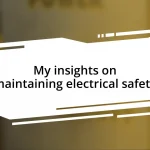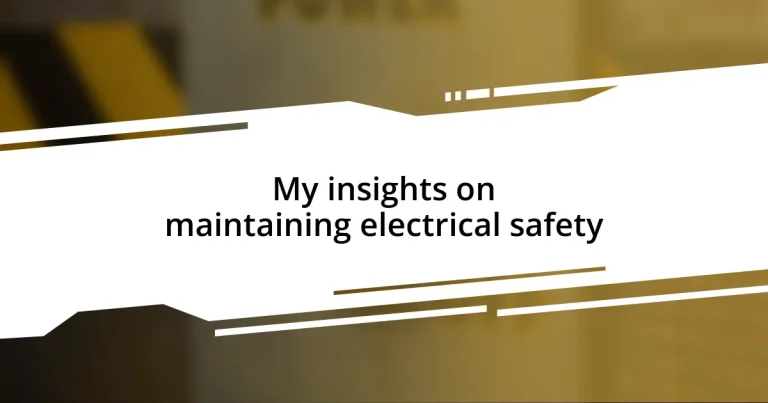Key takeaways:
- Regular inspections are essential to identify potential electrical hazards and ensure compliance with safety standards, potentially saving money in the long run.
- Common electrical hazards include overloaded outlets, frayed cords, and water near electrical sources; addressing these risks enhances home safety.
- Grounding and bonding are critical for preventing electrical shocks and fires, creating a safety net in electrical systems.
- Professional help should be sought for electrical issues to prevent escalation and ensure safety, emphasizing the importance of trusting qualified electricians.
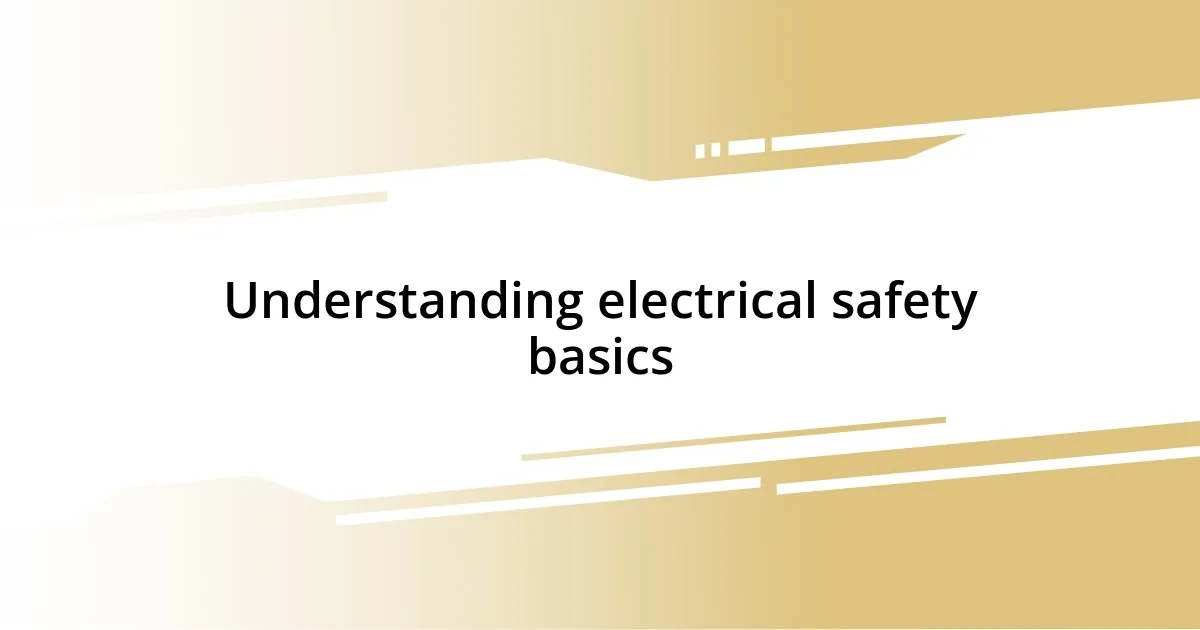
Understanding electrical safety basics
When I first started learning about electrical safety, I was surprisingly overwhelmed by just how much there was to grasp. For instance, it’s crucial to understand that electricity can be dangerous, and even small mistakes can lead to serious accidents. Isn’t it interesting how something so essential in our daily lives can also pose significant risks if we’re not careful?
One basic principle that always resonates with me is the importance of grounding electrical systems. It’s like giving electricity a safe path to follow in case something goes wrong. I remember a time when I witnessed a friend’s computer surge due to a lightning strike, and it was a stark reminder of how vital proper grounding can be. Have you ever experienced the anxiety of wondering if your home is properly grounded?
Understanding the significance of using the right tools and protective gear is another essential basic. I still recall a project where I neglected to wear rubber-soled shoes while working near an outlet. Thankfully, nothing happened, but I learned firsthand how safety gear is not just an afterthought; it’s a necessity. What small steps towards safety have you overlooked that could make a big difference?
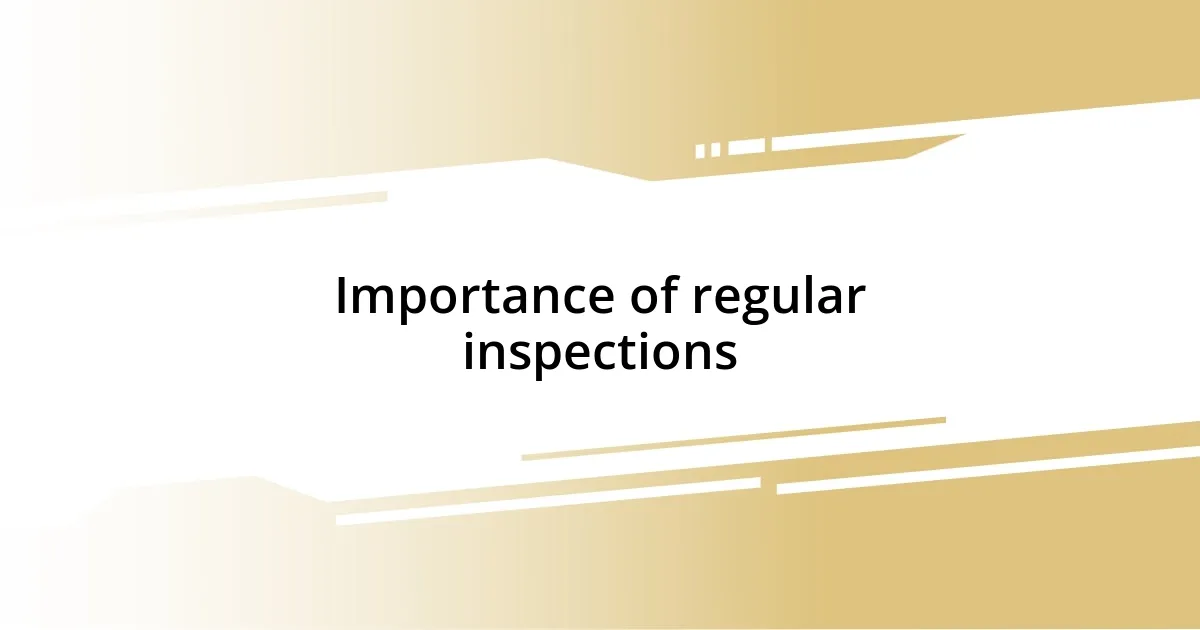
Importance of regular inspections
Regular inspections are vital in maintaining electrical safety because they help identify potential hazards before they escalate into serious issues. I’ve learned from experience that things like frayed wiring or outdated circuit breakers can easily go unnoticed during our daily routines. Just a couple of months ago, I discovered that my older home had a few outlets that weren’t functioning properly. It was a simple inspection that revealed a deeper issue with the wiring, which could have posed a fire risk if left unchecked.
Additionally, regular inspections ensure compliance with safety standards. It’s comforting to know that homes and businesses adhere to regulations that protect lives. When I worked with a local business on updating their electrical system, we found several code violations during our inspection. Addressing these issues not only improved safety but also ensured they avoided hefty fines. Wouldn’t you agree that staying compliant should be a priority for every property owner?
From a financial perspective, regular inspections can save money in the long run. Catching a problem early can prevent costly repairs and downtime. I remember a time when my neighbor had to close their café for almost a week because of a sudden electrical failure. Had they conducted a thorough inspection beforehand, they could have avoided that loss.
| Benefits of Regular Inspections | Consequences of Neglecting Inspections |
|---|---|
| Early identification of hazards | Potential for serious accidents |
| Compliance with safety standards | Fines and legal issues |
| Long-term cost savings | Expensive repairs and downtime |
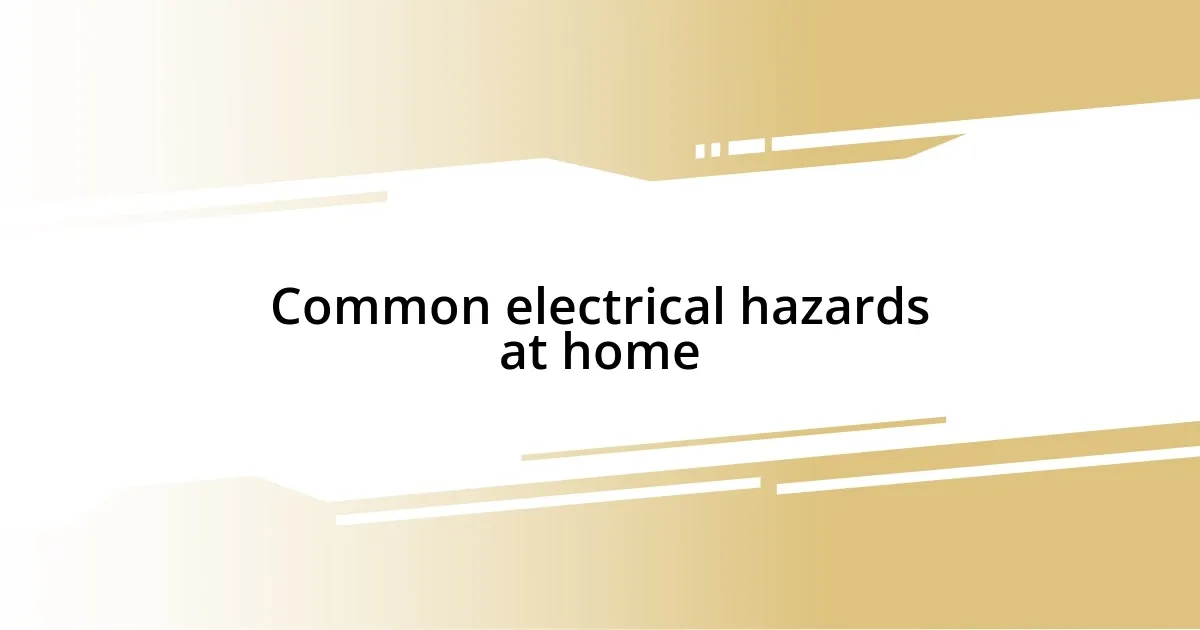
Common electrical hazards at home
When I think about common electrical hazards at home, a few specific dangers come to mind that I believe everyone should recognize. For example, overloaded outlets are a significant concern. I’ve seen friends plug in multiple devices into a single outlet, and it makes me cringe every time. The risk of overheating and potential fire is real, and it’s often overlooked amidst the convenience of our tech-heavy lives.
Here’s a list of some pervasive electrical hazards to be aware of:
- Overloaded outlets: Risk of overheating due to excessive devices.
- Frayed or damaged cords: Can lead to electric shocks or fires if not promptly replaced.
- Water near electrical sources: Water conducts electricity, creating a severe risk in wet areas.
- Improperly secured wires: Exposed wires can be a shocking hazard, especially with curious pets or children around.
- Lack of GFCI outlets in wet areas: Ground Fault Circuit Interrupter outlets are essential for safety near water sources.
Moreover, I’ve encountered instances where people neglect the importance of keeping electrical panels clear and accessible. I vividly remember when my uncle couldn’t find the main switch during a blackout, which added unnecessary stress to an already tense moment. Having clear access to your electrical panel is crucial; it can be a lifesaver in emergencies. Taking a moment to identify and address these hazards can significantly enhance safety and peace of mind in our homes. Wouldn’t you agree that a little diligence goes a long way?
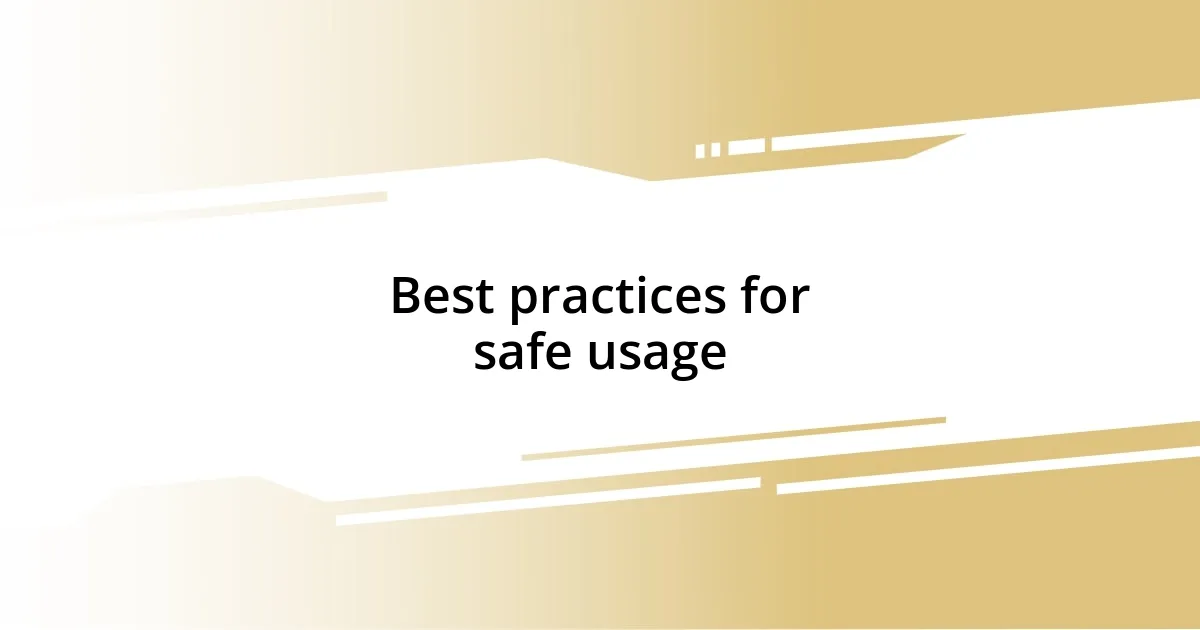
Best practices for safe usage
When it comes to safe usage of electrical systems, one of the best practices I’ve adopted is avoiding the temptation to DIY projects, especially when it comes to wiring. I remember a friend who confidently decided to rewire their living room and ended up unintentionally creating a fire hazard. The thought of their home being at risk was distressing—electrical work is complex and often requires professional knowledge. Why take that chance when the safety of your home and family is on the line?
It’s also crucial to use the right wattage for light bulbs in your fixtures. A few months ago, I was helping a relative replace bulbs in their lamp, and I noticed they were using higher wattage bulbs than recommended. It struck me how easy it is to overlook what seems like a minor detail, yet it can lead to overheating and potential fire risks. I always double-check the wattage and encourage others to do the same. Isn’t it worth taking a moment to ensure our lighting is safe?
Lastly, I can’t emphasize enough the importance of keeping electrical cords out of high-traffic areas. Just last week, I saw a toddler crawling toward a tangled mess of cords at a friend’s house, and my heart raced. Cords can easily become a tripping hazard or get damaged, leading to shocking situations. Taking the time to organize and secure cords might seem tedious, but it has a significant impact on the overall safety of our living spaces. Wouldn’t you agree that a little proactive effort can go a long way in safeguarding loved ones?
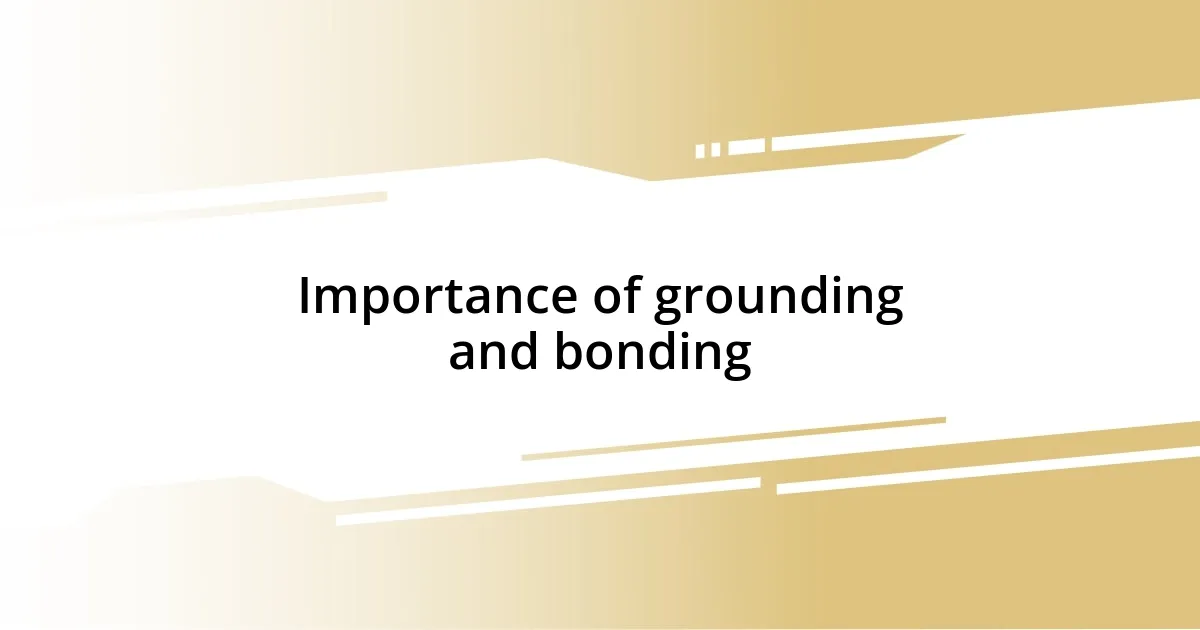
Importance of grounding and bonding
Grounding and bonding are essential for minimizing electrical hazards, offering crucial safety benefits that we can’t overlook. I often remind myself of a time when I was at a friend’s house and noticed that their electrical system wasn’t grounded properly. This oversight concerned me; grounding is vital as it directs excess electricity safely into the ground, preventing shocks and fires. Imagine touching a metal appliance during a storm—without proper grounding, the risk of electric shock skyrockets!
Bonding is equally important, as it ensures that conductive parts remain at the same electrical potential. I’ve experienced firsthand the impact of improper bonding when a family member accidentally touched a metal railing and felt a jolt due to a fault in the electrical system. It’s a stark reminder that when bonding is neglected, even seemingly harmless fixtures can become dangerous. Have you ever wondered how something as simple as a poorly bonded appliance could lead to such shocking consequences?
To put it simply, grounding and bonding create a safety net, shielding us from the unpredictable nature of electricity. I’ve seen many homes where these measures weren’t prioritized, and it genuinely worries me. One small lapse can lead to disastrous outcomes, which is why I advocate for always checking and maintaining these systems. Why take a risk with something so fundamental to our well-being? The peace of mind that comes with knowing your electrical system is secure is truly invaluable.
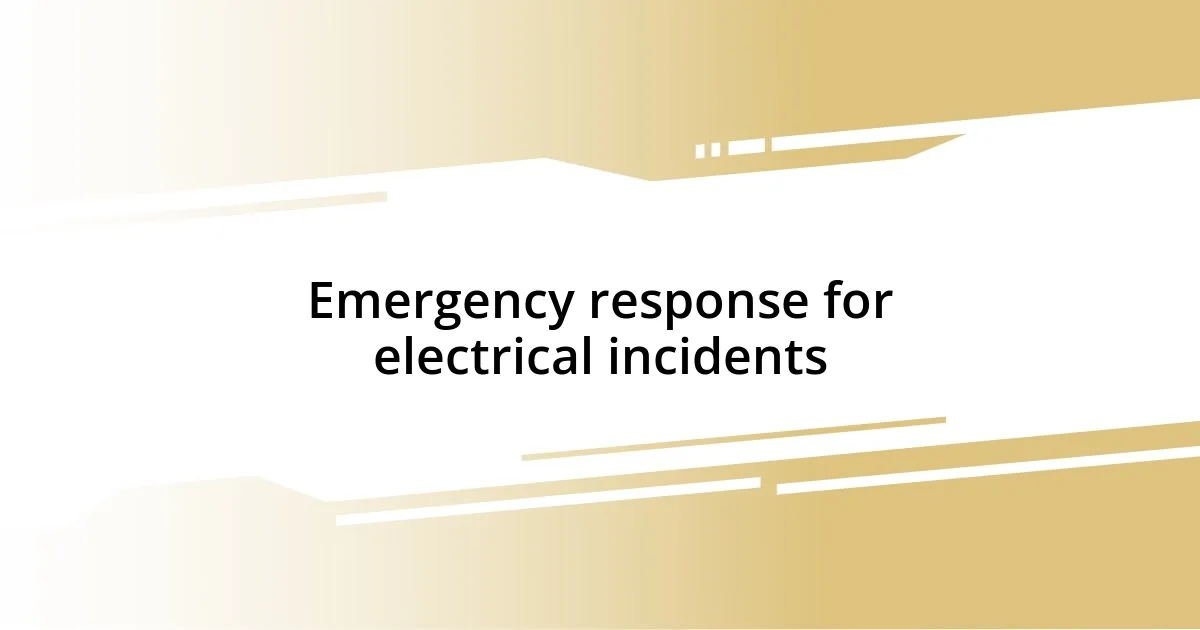
Emergency response for electrical incidents
If an electrical incident occurs, the response should be swift and deliberate. I recall a time when I was at a family gathering and someone accidentally tripped over a frayed cord, causing a short circuit. Panic ensued, and I knew that remaining calm was essential. Assessing the situation clearly can help prevent injuries—everyone needs to understand to avoid touching anything conductive, especially if there are sparks.
In my experience, knowing when to cut power can save lives. During another mishap, I quickly switched off the circuit breaker after seeing smoke coming from an outlet. Just a flick of a switch made all the difference, proving that educating yourself about your home’s electrical system is crucial. Do you know where your circuit breaker is? Familiarizing yourself with these details is empowering; it might just help you or a loved one during an emergency.
Lastly, having a plan, including calling emergency services or a qualified electrician, is vital. After that smoke incident, I made it a point to have emergency contacts saved on my phone. I realized that being prepared for electrical emergencies is no different than being ready for a medical emergency—it can make a world of difference. Have you taken steps to be prepared? After all, emergencies bring enough stress without being caught off guard.

Getting professional help when needed
When faced with electrical issues, seeking professional help is often the wisest decision. I remember a time when my home started flickering lights without any apparent reason. I tried to troubleshoot it myself, thinking I could handle it, but it turned out to be a much more serious wiring problem. The lesson I learned? Even a minor issue can escalate quickly if not addressed by a qualified electrician. Have you ever underestimated a simple flicker or buzz?
Don’t hesitate to call in experts when something feels off. Once, a friend of mine reported a persistent burning smell near an outlet. I urged them to disconnect everything and call in an electrician immediately. That decision likely saved them from a potential fire hazard. Trust your instincts when something seems wrong—ignoring warning signs can lead to devastating consequences. How often do we let our busy lives distract us from these crucial safety checks?
Investing in a professional not only ensures that potential hazards are handled with expertise, but it also brings peace of mind. I find comfort knowing there’s a certified professional behind my home’s safety. After all, tackling electrical issues without proper training can be like playing with fire—literally! It’s far better to rely on someone who knows what they’re doing. Wouldn’t you agree that safety should always come first?










